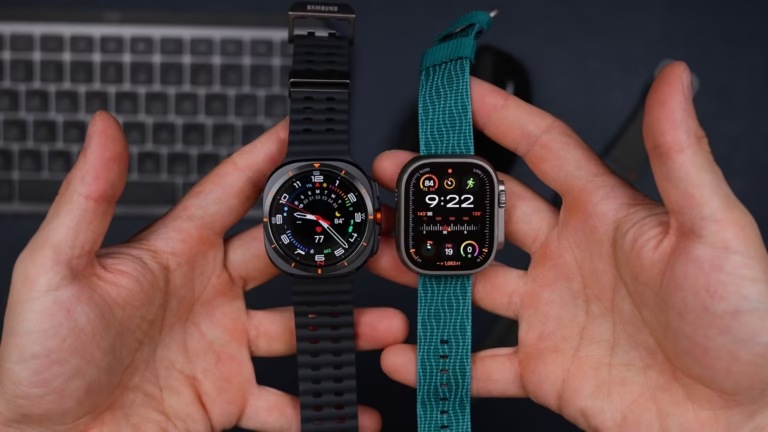Smartwatches have evolved far beyond being just timekeepers. Today, they serve as health monitors, communication devices, fitness companions, and stylish accessories. Two of the most popular smartwatches on the market are the Apple Watch and the Samsung Galaxy Watch. Both are premium products from tech giants, but they cater to different ecosystems and offer unique advantages. If you’re trying to decide between the two, this comprehensive comparison will help you make an informed choice.
1. Design and Build Quality
Apple Watch
Apple Watch is known for its iconic rectangular design, which has remained consistent through various generations. The clean lines and digital crown give it a futuristic, minimalistic appeal. Materials range from aluminum, stainless steel, to titanium in the Apple Watch Ultra.
Galaxy Watch
In contrast, the Galaxy Watch features a circular design, resembling traditional watches. This makes it particularly appealing to users who prefer a classic look. The Galaxy Watch Classic even includes a rotating bezel, offering a tactile way to navigate the interface.
Verdict:
Preference-based. If you like modern and sporty designs, go for the Apple Watch. If you prefer something that looks more like a traditional wristwatch, the Galaxy Watch is the winner.
2. Compatibility and Ecosystem
Apple Watch
The Apple Watch only works with iPhones. If you don’t have an iPhone, you simply can’t use it. However, for iPhone users, the Apple Watch offers seamless integration with services like iMessage, Apple Music, Siri, and Apple Health.
Galaxy Watch
The Galaxy Watch is compatible with Android phones, but works best with Samsung Galaxy devices. Features like ECG and blood pressure monitoring are exclusive to Samsung phones. It does not support iPhones anymore.
Verdict:
Your phone decides this for you. If you have an iPhone, go with Apple Watch. If you’re using Samsung or Android, the Galaxy Watch is your best bet.
3. Software Experience
Apple Watch
Running on watchOS, Apple offers a smooth, responsive, and app-rich experience. The user interface is intuitive, and it supports a wide range of third-party apps from the App Store.
Galaxy Watch
Samsung’s Galaxy Watch runs on Wear OS (Google) with a One UI Watch skin. It supports Google apps like Maps, Assistant, and YouTube Music, giving Android users a richer ecosystem than before.
Verdict:
Apple Watch has a more mature, refined ecosystem. But Wear OS is catching up, especially with Google’s recent improvements.
4. Health and Fitness Features
Apple Watch
The Apple Watch offers a wide range of health features, including:
- Heart rate monitoring
- ECG (Electrocardiogram)
- Blood oxygen monitoring
- Temperature sensing (useful for menstrual tracking)
- Fall and crash detection
- Workout tracking with detailed metrics
- Apple Fitness+ integration
Galaxy Watch
Samsung’s Galaxy Watch matches closely with features like:
- Heart rate tracking
- ECG
- Blood pressure monitoring (Samsung phone required)
- Sleep tracking
- Skin temperature
- Auto workout detection
- VO2 max and body composition analysis
Verdict:
Both offer excellent health tracking. Apple Watch has better software support and integration, but Galaxy Watch offers body composition and blood pressure—something Apple lacks.
5. Battery Life
Apple Watch
Battery life has always been a weak spot for the Apple Watch. Most models last 18–36 hours, while the Apple Watch Ultra can go up to 2–3 days with optimized settings.
Galaxy Watch
The Galaxy Watch generally lasts 1–2 days, and the Galaxy Watch 6 Classic can stretch it a bit more with power-saving features. Some older or larger models can even reach up to 3–4 days.
Verdict:
Galaxy Watch wins here with slightly better battery performance, especially if you prioritize longevity over features.
6. Display and Performance
Apple Watch
Apple offers a bright Retina display, always-on mode, and fluid animations. The new S9 chip (in Apple Watch Series 9 and Ultra 2) enhances performance significantly, enabling features like on-device Siri and gesture controls.
Galaxy Watch
Samsung’s AMOLED display is vivid, colorful, and sharp. The rotating bezel (in some models) adds a unique way to interact. The Exynos W930 processor ensures snappy performance.
Verdict:
Both are top-tier displays. Apple’s Retina screen edges out in brightness and responsiveness, while Samsung’s AMOLED is a treat for vibrant visuals.
7. App Ecosystem and Smart Features
Apple Watch
Apple Watch supports a large variety of third-party apps. It has native apps for email, calling, messaging, maps, Apple Pay, and more. Siri is built-in and improving over time.
Galaxy Watch
The Galaxy Watch uses the Google Play Store for apps, including Google Maps, Assistant, Spotify, and more. However, the app selection is still smaller than Apple’s. You also get Samsung Pay, Google Wallet, and Bixby (though it’s not very popular).
Verdict:
Apple Watch leads in app availability and polish, though Google integration is a strong point for Galaxy Watch.
8. Pricing and Models
Apple Watch
- Apple Watch SE: $249+
- Apple Watch Series 9: $399+
- Apple Watch Ultra 2: $799+
Galaxy Watch
- Galaxy Watch 6: $299+
- Galaxy Watch 6 Classic: $399+
Verdict:
Samsung Galaxy Watch offers more affordable entry points, but Apple provides more premium models and advanced features (especially in Ultra).
Final Verdict: Which One Should You Buy?
Choose Apple Watch if:
- You own an iPhone
- You want the best app support
- You’re into Apple Health or Fitness+
- You want gesture controls, on-device Siri, or Apple Pay
Choose Galaxy Watch if:
- You have an Android or Samsung phone
- You want a traditional round design
- Battery life is a priority
- You want features like body composition and blood pressure tracking
Conclusion
Both the Apple Watch and Samsung Galaxy Watch are powerful, feature-rich smartwatches. Ultimately, your decision should be guided by the phone you use, your design preference, and which features matter most to you. Apple offers better ecosystem integration and app support, while Samsung offers a more open platform and longer battery life. Either way, you’re getting one of the best smartwatches in the market.

